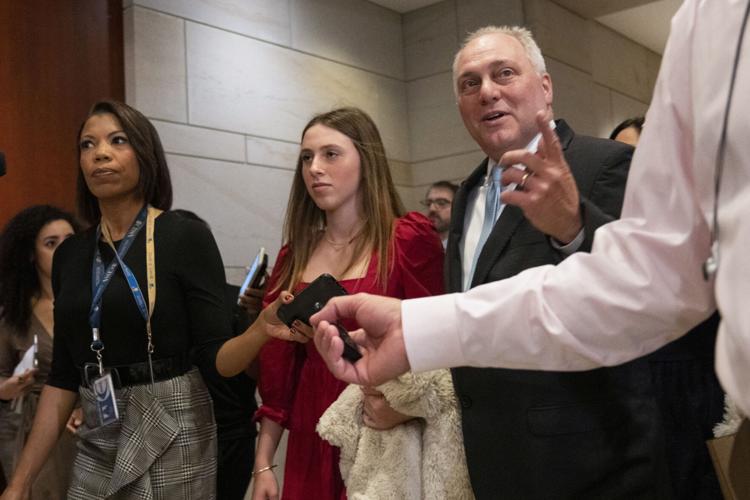WASHINGTON – Looking out of his office window, the one next to the fireplace, House Minority Whip Steve Scalise points out how the curve of U.S. Capitol dome leads the eye to the Statue of Freedom at the very top.
“The Capitol Dome, the Statue of Freedom, it continues to give me goosebumps,” Scalise said in a recent interview. “I only have a few more times to see this view.”
Soon Scalise’s vista will change, probably to larger offices with a better view of the National Mall.
As of Monday, five races in the 435-seat U.S. House of Representatives remain undecided. But enough Republican representatives were elected in the congressional midterms – 218 – for the GOP to control a bare majority of the House.
Scalise, a Republican who lives in the New Orleans suburb of Jefferson, was elected last week as the majority leader, the second highest post in the House. Come January, when new members are sworn in for their two-year terms, Scalise will be in charge of setting the work schedules, legislative timelines and agenda for votes.
“Any bill is going to be a challenge to pass," Scalise said of the narrow majority Republicans will hold of no more than five seats. "But you have to work with everybody to get those bills put together in the first place. We ran on our ‘Commitment to America’ platform, which really focused on getting our economy back on track, reducing inflation, lowering energy costs, securing the border, dealing with the challenges families are facing.”
Republicans have a lot of plans but are still deciding what bills to pursue first and second.
“We are having those conversations now,” Scalise said.
Some cliques in the Republican House are advocating impeachments, investigatory committees and hauling the president’s son, Hunter Biden, before Congress once they acquire the subpoena power that comes with being in the majority.
Asked about such investigations, Scalise says he does believe in legislative oversight of the executive branch.
It’s part of the majority’s duty, he says, adding that he’d like to see more particulars on how money was spent in reaction to the COVID pandemic.
“We want to identify," he said. "We want to clean it up and we want to take funding away from places that are abusing taxpayer dollars and get reduced levels of spending.”
But what really seems to animate Scalise is passing bills that he says will address pocketbook issues of struggling families.
“We can’t control what happens outside of the House but we need to set the tone,” Scalise said. “Now that we got the majority, we want to go pass those bills.”
The GOP platform, as outlined in the “Commitment to America,” includes a wide array of legislative goals but few specifics.
Scalise, whose leadership position requires him to leave the House Energy and Commerce committee, talks most about energy issues. How those measures will be presented is still being decided, he added.
“We might have some bills dealing specifically with things like permitting or pipelines or leasing details," he said. "But then there might be some large energy package, too, because there are a lot ideas here about getting America energy independent again.”
On Sunday, the Houston Chronicle published an essay that Scalise wrote with Rep. Beth Van Duyne, the Republican representing the suburban communities between Dallas and Fort Worth.
The essay used the now-usual harsh terms to belittle the Biden administration's concerns about global warming. They trumpeted one bill they want to pass, writing that the Strategy to Secure Offshore Energy Act “directs the Biden administration to lay out a five-year plan for offshore oil and gas sales.”
But the first thing facing Congress - and Scalise - when they return the Monday after Thanksgiving is paying the bills. If by the end of the day on Friday, Dec. 16, both chambers haven’t agreed on what’s called a continuing resolution, then government shuts down, interfering with pay for military and federal agency workers and curtailing government services.
Other issues threaten to entangle this must-pass legislation.
The Democrats, who will control both the House and the Senate through the end of the year, want to increase the “debt limit.” That cap limits how much money the federal government can borrow to pay its debts.
Republicans likely will seek concessions, such as beefing up protection along the border with Mexico, in exchange for authorizing the payment of the nation’s obligations.
But GOP members haven’t decided yet what issue to pursue.
“The administration really hasn’t started negotiating with us on how to get end-of-year agreement on funding of government, so we’ll see if the conversations happen in the weeks ahead,” Scalise said.
Scalise would prefer to pass the continuing resolution, then visit the debt ceiling next year – when Republicans are in charge.
“When we become the majority, there’s going to have to be direct negotiations because we’ll be in the majority and we have already talked amongst ourselves about what we want to do to confront our debt crisis, to have more of a focus on the way money is spent and the way money has been wasted,” Scalise said.


